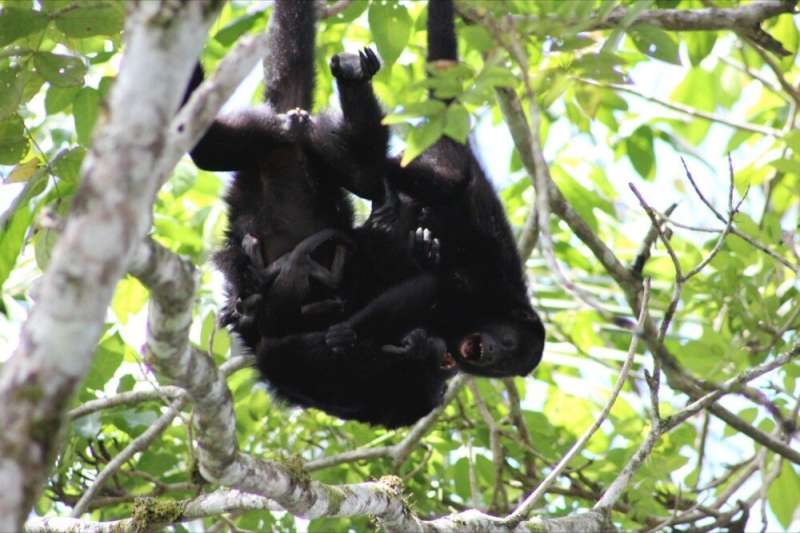
Adult howler monkeys use play to avoid conflict and reduce group tension, with levels of play increasing when they are faced with scarce resources.
The study was carried out by a team of researchers from Spain, Brazil and the UK and was published in the journal Animal Behaviour.
The amount of time adults play with other adults and with juvenile monkeys is measured by the researchers.
Howler monkey play involves individuals hanging from their tails and making facial expressions. Howler monkeys have an inactive lifestyle due to their mainly leaf-based diet, and play is an energy-costly activity.
The amount of adult play is linked to the number of potential playmates, increasing in line with the size of the group. Adult females spend more time playing with other adults than adult males.
The researchers found that play increases with time spent on fruit. Howler monkeys eat leaves and fruit, which is highly prized, and they compete for it.
Howler monkeys don't have a hierarchy of social status, and they don't engage in collective grooming, which is used by some primate for group cohesiveness and tension reduction. According to the study authors, play has a key role in helping howler monkeys regulate relationships within their social group and avoid conflict.
Despite its appearance, play is not always associated with frivolity or education according to the co-author. We think it is an important function in howler monkey society to reduce tension when there is competition for scarce resources.
We found that levels of play are at their highest when howler monkeys are feeding on fruit, which is a valuable and defendable resource. Females are more vulnerable to food competition than males. Howler monkeys are an energy-conservative species, and we would have assumed females would have played less, as they are also constrained by the energy requirements of reproduction.
One theory for the positive effect of fruit consumption on play is that a fruit-based diet simply provides howler monkeys with more energy compared to their typical diet of leaves.
If this was the case, we should have observed adults engaging in more play with all members of the group, rather than just with other adults. We believe that play amongst adults is a mechanism for resolving conflicts within the group in a similar way that grooming is used by some other primate species.
More information: Socioecological correlates of social play in adult mantled howler monkeys, Animal Behaviour (2022). DOI: 10.1016/j.anbehav.2022.01.017 Journal information: Animal Behaviour Citation: Monkeys play to reduce group tension, study finds (2022, March 16) retrieved 17 March 2022 from https://phys.org/news/2022-03-monkeys-group-tension.html This document is subject to copyright. Apart from any fair dealing for the purpose of private study or research, no part may be reproduced without the written permission. The content is provided for information purposes only.